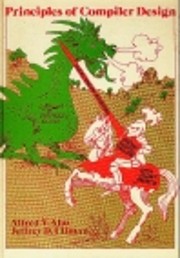

Klik op een omslag om naar Google Boeken te gaan.
|
Bezig met laden... Principles of Compiler Design (1977)door Alfred V. Aho, Jeffrey D. Ullman
 Geen Bezig met laden...
Meld je aan bij LibraryThing om erachter te komen of je dit boek goed zult vinden. Op dit moment geen Discussie gesprekken over dit boek. geen besprekingen | voeg een bespreking toe
Onderdeel van de uitgeversreeks(en)
Geen bibliotheekbeschrijvingen gevonden. |
Actuele discussiesGeenPopulaire omslagen
 Google Books — Bezig met laden... Google Books — Bezig met laden...GenresDewey Decimale Classificatie (DDC)001.6425Information Computing and Information Knowledge [formerly : Data processing] [formerly : Electronic] [formerly : Computer programs and programming] [formerly : Software & its use]LC-classificatieWaarderingGemiddelde: (3.77) (3.77)
Ben jij dit?Word een LibraryThing Auteur. |
|||||||||||||||||||||||||||||||||||||||||||||||||||||||||||||||||||||||||||||||||||||||||||||||||||||||
Standardlærebogen i compilerdesign, dvs hvordan man skriver en oversætter til et højniveausprog.
I 1981 skrev Michael Schwartzbach en oversætter fra Aka til Pascal og jeg skrev runtimebiblioteket. I 1982 skrev Michael en oversætter til mellemkode og jeg skrev fortolkeren af A-kode. Michael var på vej til USA, så han skrev compileren først. Så skrev jeg fortolkeren og en seddel med underligheder i oversætteren, så da han kom tilbage fra USA gik der et par dage med at rette og så virkede systemet ellers fint i flere år. En af superbrugerne var instruktoren Per Frederik Vilhelm Hasle Harlung, som blandt andet fandt en memory leak. Gad vide om ikke vi kiggede lidt i den her bog undervejs? (